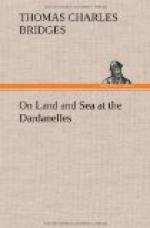Sure enough, a minute later came the order for advance, and, refreshed by their long rest, the Australians and New Zealanders came pouring over their parapet, and with bayonets flashing in the evening sun, rushed forward through the scrub.
For the first two hundred yards there was hardly a check, then all of a sudden the scattered fire thickened.
‘They’re in the ravine, bhoys,’ shouted O’Brien. ’Don’t be waiting to shoot. Give thim the steel.’
The firing grew heavier. Many of the gallant Colonials dropped, but the only effect upon the rest was to make them race forward at greater speed.
Ken saw before him a dark line seamed with spits and flashes of flame. A bullet clipped past his ear so close that he felt the wind of it. He never paused. Next moment he was over the lip of the shallow ravine in which the Turks had entrenched themselves.
On the two previous occasions when he and his comrades had attacked Turkish trenches, the enemy had defended themselves bravely. Now they seemed no longer to have any stomach for the fight. As the Colonials poured like an avalanche into the ravine the Turks turned, and scrambling wildly up the far side, bolted for their lives.
But the Colonials, with the bitter memory in their minds of all they had suffered during the previous night and day, were not minded to let them escape so easily. With loud shouts they gave chase. The Turks, good marchers but poor runners, stood no earthly chance in this terrible race, and by scores and hundreds were bayoneted or seized and dragged back as prisoners.
Filled with mad excitement, Ken raced onwards in the forefront of the line. His bayonet was dripping, a red mist clouded his eyes, for the moment he was fighting mad.
He stumbled over a log and nearly fell. He realised that he was in a small wood of low-growing trees with wide spreading branches. To his right he heard shouts and shrieks and the sound of shots, but for the moment there was not another soul in sight.
His throat was like a lime kiln. He stopped a moment to take a swallow of water from his felt-covered flask, then went forward again.
He came to an open space, and as he reached its edge saw four men with a quick-firer hurrying frantically across the open to the trees on the far side.
Three were Turks, but the fourth wore the gray-green of a German officer. The latter was short and—for a German—slight. Something about him seemed vaguely familiar.
At that moment he turned and glanced round, and Ken saw his face. He could hardly believe his eyes. The man was Kemp, ex-steward of the ’Cardigan Castle.’ There could be no doubt about it. That sallow complexion, the low forehead, and the thick black eyebrows which met above his nose were quite unmistakable.
Without an instant’s hesitation Ken flung up his rifle and fired straight at the man. But blown with long running, his hand shook. At any rate, he missed, and next instant the German, the Turks, and their gun vanished into the trees opposite.




